It's suicide bombing
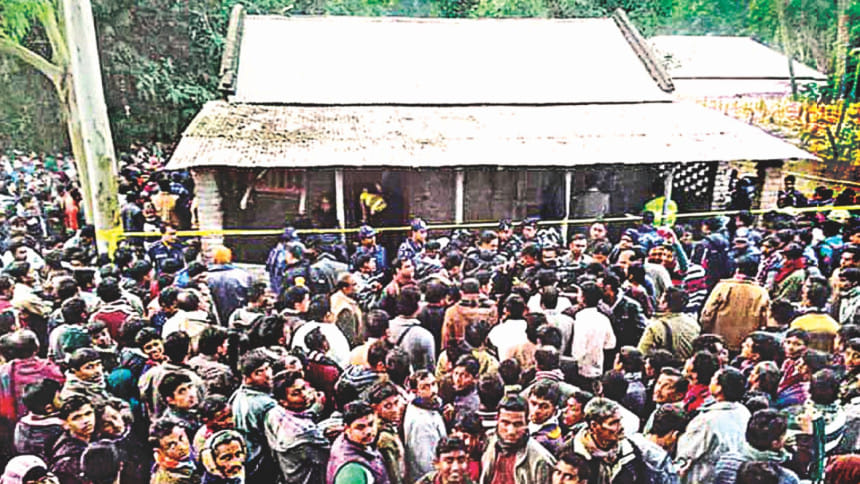
It was a suicide attacker who blew himself up inside an Ahmadiyya mosque in Rajshahi on Friday, initial police findings and the autopsy report have confirmed.
While the investigators point finger at the outlawed Jama'atul Mujahideen Bangladesh (JMB) for the attack, US-based SITE Intelligence Group has reported that the Islamic State militants have claimed responsibility for it.
The IS claim could not be independently verified.
The attacker, aged around 20, detonated the bomb around 1:35pm during Juma prayers inside the mosque at Sayedpur Chalkpara village under Bagmara upazila.
Around 70 members of the Ahmadiyya community -- a Muslim sect that has been frequently targeted by the radical Islamists in Bangladesh -- were offering prayers at the time.
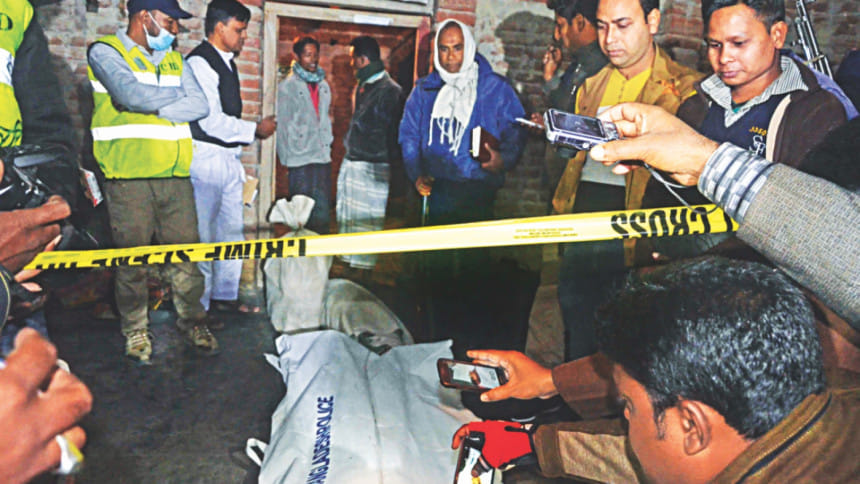
Three devotees were wounded in the attack. The injured -- Moyez Uddin Talukdar, 50, his brother Shaheb Ali Talukhdar, 35, and Nayan, 11 -- were admitted to Rajshahi Medical College Hospital (RMCH).
The bomber, yet to be identified, was wearing an explosives vest and his left wrist was blown off and chest badly damaged in the blast, said Dr Enamul Haque, who performed the autopsy.
"We also found numerous splinters inside his abdomen and other parts of his body," said the lecturer of forensic department at the RMCH.
"It is clear that he was carrying the bomb on his left hand when it detonated," he added.
The autopsy findings were corroborated by Abdullah Al Mahmud, additional deputy inspector general of Rajshahi range police.
He said the bomb vest, worn underneath the attacker's T-shirt, had electric circuits, switches, batteries and wires attached to it.
"Signs are clearly there that it was a suicide attack. But we need some more time to be fully sure about that," he told The Daily Star.
Police suspect the bomber had an accomplice with him during the attack. The other man was "a bit aged" and was wearing jeans and jacket and fled the scene after the blast, said Motiar Rahman, officer-in-charge of Bagmara Police Station.
The Criminal Investigation Department, the Police Bureau of Investigation, the Detective Branch of police and the Rapid Action Battalion were investigating the attack.
In recent months, two foreigners have been killed, two Christian clergymen including an Italian priest attacked and injured, and a Shia Muslim gathering, two Hindu temples and at least one mosque of Bangladesh Navy have come under bomb attacks.
The JMB, which started its militant activities in Bagmara in 2004, might have been behind Friday's attack, said OC Motiar. "But we are yet to ascertain it."
However, SITE Intelligence Group, which monitors terror activities globally, says that the IS took credit for the attack.
In a communique distributed on Twitter and Telegram yesterday, the group identified the bomber as Abu al-Fida' al-Benghali, and said he detonated his explosives belt at a "temple" of the "polytheist Qadiani sect", a derogatory term for Ahmadiyyas.
HOW IT HAPPENED
Injured Shaheb Ali knew pretty much all the fellow Ahmadiyyas in Sayedpur Chalkpara village, some 55km from Rajshahi city.
Before the prayers began, he spotted an unknown face inside the mosque.
"When I asked him who he was, he identified himself as a student of Rajshahi Polytechnic Institute. He also said he was originally from Mohonpur upazila [of Rajshahi]", Shaheb Ali told this correspondent at the RMCH.
"The youth sat in the second row of the devotees and I asked him to fill a blank space beside me in the first row.
"During the second rakat of the prayer, I saw him bringing out something from his pocket. The bomb exploded right then and I fell unconscious."
There were some 70 people, including 30 women, offering their prayers in three rows at the time of the blast, said Shaheb Ali.
WHAT POLICE HAVE DONE SO FAR
Police yesterday filed a case against the two unknown assailants in connection with the incident.
As of yesterday evening, police have collected forensic evidence from the spot and took court's permission to send the blood sample, nails and finger print of the bomber to the CID lab in Dhaka for tests to identify the bomber.
"We will send them to Dhaka tomorrow (today)," the Bagmara OC said last night.
However, the police did not go to Rajshahi Polytechnic Institute to check whether the suicide attacker indeed was a student of the institute.
"We came to know through the media that he was a student of ours," Ali Akbar Khan, vice-principal of the institute, said when contacted.
"We also heard that detectives would come with photos and other details to identify the dead. We waited till [yesterday] afternoon with all the student records but none came," he added.
Leaders of the Ahmadiyya community there, meanwhile, claimed the law enforcers picked up three of their members after the incident.
Two of them were released yesterday afternoon but they were yet to know the whereabouts of Hafez Abu Sayeed, who was from Bakshibazar in Dhaka and had been staying at the mosque for last one month for teaching the religious scriptures to Ahmadiyya children.
However, Bagmara OC Motiar said they did not arrest anyone but picked up some people to collect information about the attack.
THEY WERE ALERTED BEFOREHAND
Saiful Islam, president of Ahmadiyya Muslim Community in Bagmara and imam of the mosque, said police had earlier warned them several times about possible attacks.
The central unit of Ahmadiyya Muslim Jamaat too had asked them for ensuring security of the mosque during prayers.
"So, we employed a guard at the mosque. Moyez Uddin Talukdar, who was injured in the attack, was the security guard. It was his duty to inquire about any unknown person at the mosque," Saiful added.
Moyez Uddin said had noticed two unfamiliar youths inside the mosque.
"But I didn't inquire about their identities as I saw them speaking to the others inside the mosque. I thought they must have come with someone from our community."
UNSAFE, AFRAID
"The overall violent situation, including attacks on the establishments belonging to different religious minorities, is alarming," said Ahmad Tabshir Choudhury, external affairs and public relations secretary of Ahmadiyya Muslim Jamaat, Bangladesh.
There are around one lakh Ahmadiyyas in the country and the number of their mosques is 175, according to him.
"We have many mosques in remote areas. It is not possible for us to arrange adequate security for all of those on our own," he said, adding that they were seeking the local administrations' help in this.
A FREQUENT TARGET
The Ahmadiyyas in Bangladesh have been subjected to religious persecution for over two decades.
The first major attack came on them in October 1992 when Jamaat-e-Islami men stormed the Bakshibazar head office of the Ahmadiyya Muslim Jamaat and vandalised it, said Abdul Awwal, missionary-in-charge of the organisation.
The worst attack was carried out in October 1999 when a time-bomb was detonated inside an Ahmadiyya mosque in Khulna.
"Seven people were killed and scores others injured in the attack," he said.
Between 2003 and 2006, Khatme Nabuwat men either carried out or attempted 36 attacks on the Ahmadiyyas in different districts, he said.
"In January 2004, the then BNP-led government banned all publication of our organisation."
Three attacks on the Ahmadiyyas took place in Tangail in 2010.
"But Friday's incident is the biggest in recent time," Awwal added.
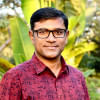
 For all latest news, follow The Daily Star's Google News channel.
For all latest news, follow The Daily Star's Google News channel. 




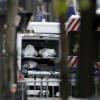
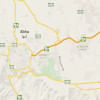


Comments